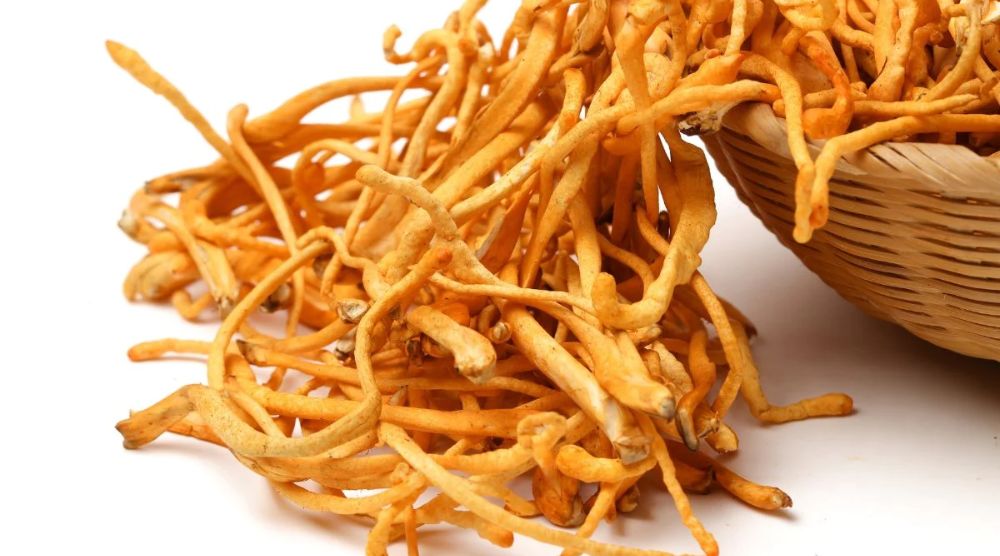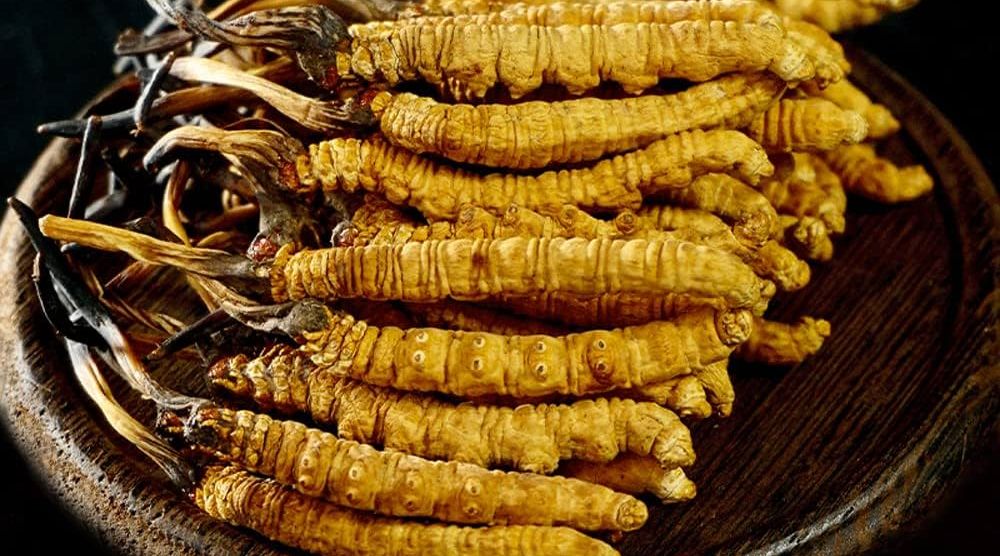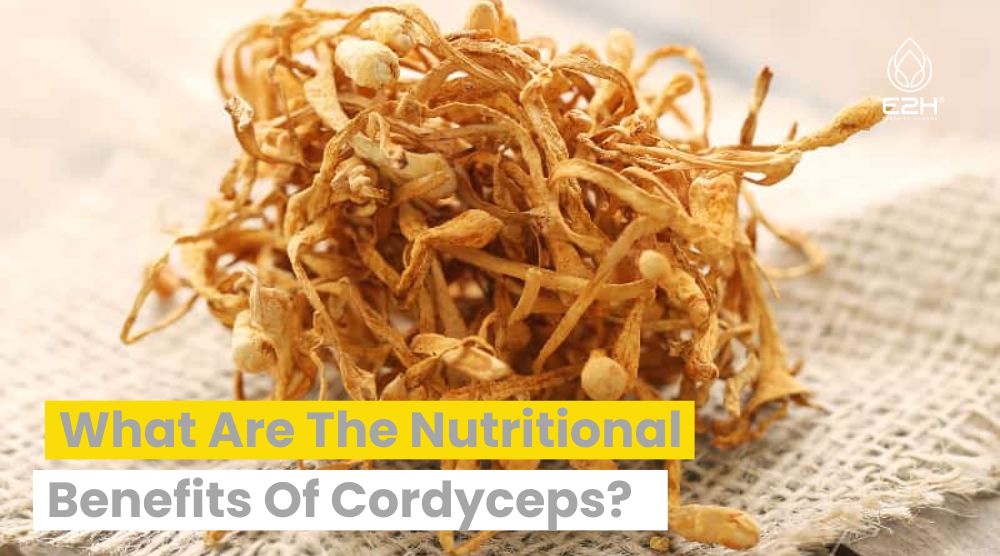What Are The Nutritional Benefits Of Cordyceps: Cordyceps offer nutritional benefits like enhancing energy, potentially improving exercise performance, providing anti-aging antioxidants, and harboring potential anti-tumor and anti-inflammatory properties.
From potentially boosting athletic performance to offering a cascade of antioxidants, this mushroom whispers promises of well-being and vitality.
Let’s explore the scientific and traditional perspectives on the nutritional benefits of Cordyceps, understanding how this peculiar fungus has secured its spot in the limelight of nutritional discussions.
What are the nutritional benefits of Cordyceps?
Cordyceps, a type of medicinal mushroom, is lauded for its array of nutritional and health-promoting benefits. Rich in various bioactive compounds, such as cordycepin and adenosine, Cordyceps are believed to enhance vitality and potentially boost athletic performance by increasing the production of adenosine triphosphate (ATP) and improving the body’s utilization of oxygen.

The mushroom also harbors antioxidant properties, which may confer anti-aging benefits and mitigate oxidative stress. Cordyceps have been studied for their potential anti-tumor and anti-inflammatory effects, offering a promising avenue for further research in supporting immune health in lung cancer and combating inflammation. Furthermore, certain compounds in Cordyceps
What are the nutritional components of Cordyceps?
Cordyceps, often revered for their medicinal properties, contain a myriad of nutritional components that contribute to their long term health-promoting reputation. They are a source of essential amino acids, various types of essential minerals, and vitamins. Cordyceps contain a special type of sugar that may be beneficial for managing diabetes.
Additionally, they are known to contain certain bioactive compounds, including cordycepin and adenosine, which have been studied for their anti-inflammatory, anti-aging, and potential anti-tumor effects. The fungi also contain antioxidants, which are crucial in neutralizing free radicals, thereby against cancer cells potentially delaying the aging process and mitigating oxidative stress.
What vitamins and minerals are found in Cordyceps?
Cordyceps are a source of various vitamins and minerals, contributing to their health-promoting properties. They contain Vitamin B12, which is often associated with improved nerve and kidney function, and the production of DNA.
Minerals such as manganese, zinc, iron, and potassium are also found in Cordyceps, playing vital roles in maintaining bone health, immune function, oxygen transport, and regulation of blood pressure, respectively. The presence of these vitamins and minerals enhances the nutritional profile of Cordyceps, making them a valuable addition to diets, especially when seeking specific nutrient uptakes.
Are there any health benefits associated with Cordyceps consumption?
Cordyceps have been associated with a plethora of health benefits, backed by both traditional use and scientific research. Some of the notable benefits include:
- Boosting Exercise Performance: By potentially increasing ATP production and improving oxygen utilization.
- Anti-Aging Properties: Attributed to their antioxidant content.
- Anti-Tumor Effects: Demonstrated in various animal and test-tube studies.
- Managing Type 2 Diabetes: By mimicking the action of insulin.
- Heart Health: Through potential effects on arrhythmias and cholesterol levels.
- Anti-Inflammatory Properties: By suppressing proteins that increase inflammation.
Can Cordyceps boost energy levels?
Cordyceps have been traditionally utilized to enhance energy levels and are often associated with improved vitality and endurance. The fungi are believed to increase the body’s production of adenosine triphosphate (ATP), which is pivotal for delivering energy to the muscles.
This enhancement in ATP production may improve the way your body uses oxygen, especially during exercise, potentially reducing fatigue and boosting energy levels.
In some studies, Cordyceps have been shown to increase measures of exercise performance in both younger and older adults, indicating a potential role in enhancing energy utilization and stamina, although the exact mechanisms and broader applicability to all populations need further research.
Can Cordyceps improve athletic performance?
Cordyceps have garnered attention for their potential to enhance athletic performance, primarily through the purported increase in the body’s production of adenosine triphosphate (ATP), which is vital for delivering energy to the muscles.
This could, theoretically, improve the way the body uses oxygen, especially during physical exertion. Some studies, including those involving older adults, have indicated an improvement in measures of exercise performance and an increase in VO2 max, which determines fitness levels.
However, it’s crucial to note that research suggests Cordyceps might not be effective in improving exercise performance in well-trained athletes, indicating that the benefits might be more pronounced in populations with varied fitness levels.
How does Cordyceps affect metabolism and weight?
The impact of Cordyceps on metabolism and weight is an area that warrants further research. While specific studies directly correlating the effects of Cordyceps with metabolic rate and weight management are limited, some research suggests that the fungi may influence blood sugar levels, which can indirectly impact metabolism and weight.

Cordyceps have been in studies have shown them to decrease blood sugar levels in some animal studies, which might influence insulin sensitivity and thus, metabolic rate. However, the exact mechanisms and potential applications of Cordyceps in weight management and metabolic health in humans remain to be thoroughly explored and validated through comprehensive scientific studies.
What are the medicinal uses of Cordyceps in traditional Chinese medicine?
In Traditional Chinese Medicine (TCM), Cordyceps have been utilized for centuries, revered for their myriad of medicinal properties. They have been employed to treat fatigue, enhance strength and stamina, and boost sex drive. Additionally, Cordyceps have been used to manage chronic kidney disease and improve respiratory health.
The fungi have also been associated with longevity and are often used in herbal medicine as a general tonic to improve overall health and vitality. The traditional uses of Cordyceps in TCM often align with enhancing life quality, improving energy levels, and addressing various health ailments, although the scientific validation of these uses varies.
Are there any side effects of consuming Cordyceps?
While Cordyceps have been used traditionally and in various dietary supplements, without widespread reports of adverse effects, the scientific literature on their safety profile is not extensive. Some individuals might experience mild side effects, such as gastrointestinal discomfort, diarrhea, dry mouth, and nausea.
There have been isolated reports of Cordyceps being associated with lead poisoning, increase the risk is likely due to contamination. Additionally, due to their potential impact on the immune system and blood sugar levels, individuals with auto-immune diseases or those managing diabetes should approach Cordyceps with caution.
It’s imperative to approach the consumption of Cordyceps and similar supplements with a mindful consideration of potential individual reactions and underpinning health conditions.
What is the recommended dosage of Cordyceps supplements?
The recommended dosage of Cordyceps can vary depending on the specific supplement and the purpose for which it is being used. In some human research studies, dosages of 1,000–3,000 mg per day have been utilized.
However, due to the variability in Cordyceps supplement formulation (such as the use of different species or extraction methods), it can be challenging to establish a universal recommended dosage.
It’s pivotal to adhere to the dosage guidelines provided on specific supplement labels and to consider the form of Cordyceps being used (such as CS-4 or militaris), as different forms might have varied potencies and recommended dosages.
How does Cordyceps compare to other medicinal mushrooms like Reishi or Chaga?
Cordyceps, Reishi, and Chaga are all celebrated in the realm of medicinal mushrooms, each offering distinct health benefits. Cordyceps are often associated with enhanced vitality and athletic performance due to their potential to increase ATP production.
Reishi, known as the “mushroom of immortality,” is often linked with immune system support and stress reduction. Chaga is celebrated for its antioxidant properties, potentially aiding in reducing inflammation and enhancing immune function.
While all three mushrooms have purported health benefits, often related to immune function and vitality, they are each traditionally used and studied for slightly different health-promoting properties.
Where can I buy Cordyceps supplements or products?
- E2H (Earth to Humans): A platform offering various health and wellness products, potentially including Cordyceps supplements, with a focus on natural and sustainable offerings.
- Amazon: A global online marketplace where you can find a wide array of Cordyceps supplements in various forms like powders, capsules, and tinctures from numerous brands.
- Walmart: With both physical stores and an online platform, Walmart provides a range of health supplements, possibly including Cordyceps, catering to various consumer needs.
- Local Store: Health food stores, pharmacies, and specialty stores in your locality might offer Cordyceps supplements
What are some Cordyceps mushroom recipes?
Cordyceps can be incorporated into various recipes, often in the form of a powder or tincture. A popular way to consume them is in teas or broths, where powdered Cordyceps can be simmered with other ingredients.
They can also be added to smoothies, providing a nutritional boost without altering flavor significantly. Cordyceps coffee, blending the mushroom powder with regular coffee beans, is another popular concoction, purported to provide enhanced energy and vitality.
Additionally, Cordyceps can be integrated into soups, stews, and even baked goods, offering a versatile option for those looking to incorporate them into their diet.
Does Cordyceps interact with any medications?
Cordyceps may interact with certain medications due to their impact on the immune system and blood sugar levels. Individuals taking insulin or oral hypoglycemic agents should exercise caution due to the effect of Cordyceps’ potential to lower blood sugar levels.
Additionally, since Cordyceps might have immune-modulating effects, they could interact with immunosuppressive medications, potentially altering their efficacy.

While the scientific data regarding interactions is not exhaustive, it’s prudent to approach the combination of Cordyceps with certain medications mindfully and in consultation with a healthcare professional.
Are there any risks associated with Cordyceps harvesting in the wild?
Harvesting Cordyceps in the wild, particularly Cordyceps sinensis, which grows on the Tibetan Plateau, can present various risks. The fungi are often found in high-altitude regions, presenting physical challenges and potential health risks to harvesters.
Due to the high value of wild Cordyceps, overharvesting is a concern, potentially impacting local ecosystems and the sustainability of the species. There have also been instances of conflict and exploitation related to the lucrative Cordyceps harvesting industry.
Ethical and environmental considerations are pivotal when considering wild-harvested Cordyceps, and thus, cultivated alternatives are often used in supplements.
What is Cordyceps sinensis and how is it related to nutrition?
Cordyceps sinensis is a species of the Cordyceps genus, renowned for its traditional and medicinal use, particularly in Chinese medicine. In terms of nutrition, Cordyceps sinensis is often highlighted for its potential to enhance vitality and energy levels, potentially linked to its purported ability to increase ATP production.
It also contains various bioactive compounds, including cordycepin, and is a source of antioxidants. While it has been traditionally used to address various health concerns, including fatigue and respiratory issues, the scientific validation of its nutritional and medicinal benefits requires further comprehensive research and human trials.
FAQs
What compounds in Cordyceps contribute to its nutritional benefits?
Cordyceps contain cordycepin, adenosine, antioxidants, and a unique sugar, which collectively contribute to its various nutritional and health benefits.
How do Cordyceps potentially enhance physical performance nutritionally?
Cordyceps may increase ATP production and improve oxygen utilization, potentially enhancing exercise performance and reducing fatigue.
Can Cordyceps support metabolic health through its nutritional components?
Yes, Cordyceps may support metabolic health by influencing blood sugar levels and potentially impacting insulin sensitivity.
What role do the antioxidants in Cordyceps play in nutrition and health?
Antioxidants in Cordyceps may neutralize free radicals, potentially reducing oxidative stress and supporting anti-aging processes.
How might the nutritional properties of Cordyceps benefit the immune system?
Cordyceps may modulate the immune system, potentially offering support through its bioactive compounds and impacting overall health.
Conclusion
In the journey through the nutritional landscapes of Cordyceps, we’ve explored its traditional roots and scientific inquiries, uncovering a tapestry of potential benefits that intertwine ancient practices with contemporary wellness. The potential of Cordyceps to enhance our vitality, support metabolic health, and provide a source of unique nutrients invites further exploration and appreciation. As we continue to seek pathways to wellness, the subtle whisper of the Cordyceps mushroom, echoing from ancient forests and traditional remedies, offers a gentle nudge towards considering the wisdom hidden within nature’s offerings. May your journey through wellness be ever enriched by such natural wonders.














